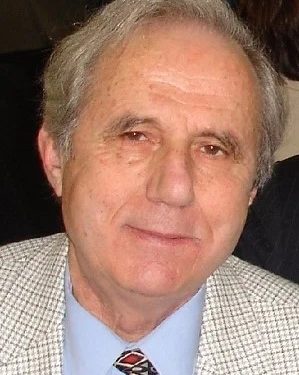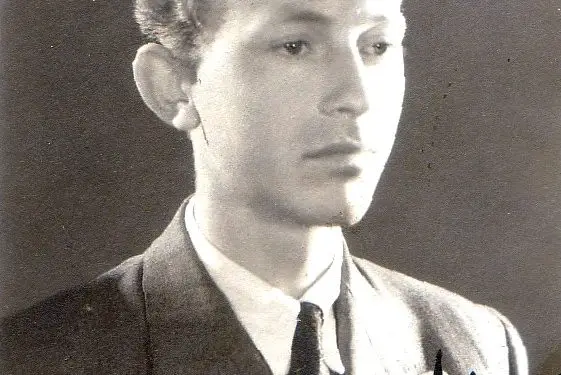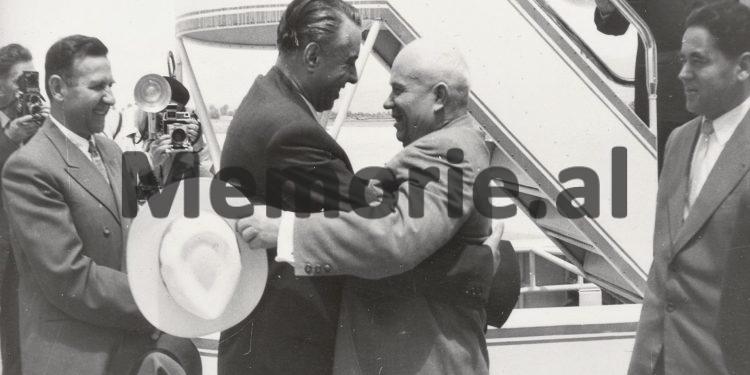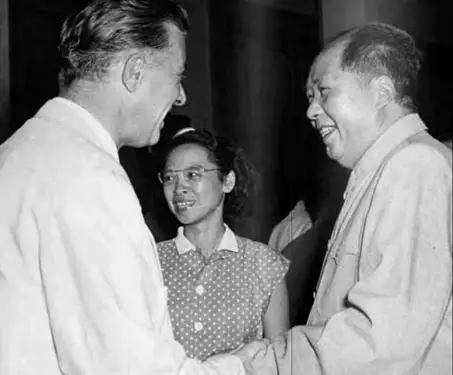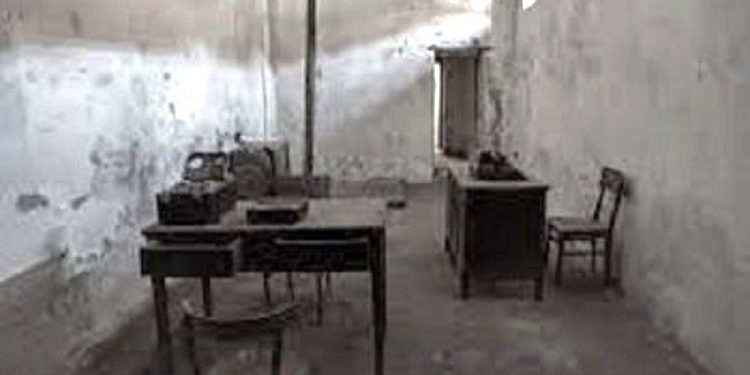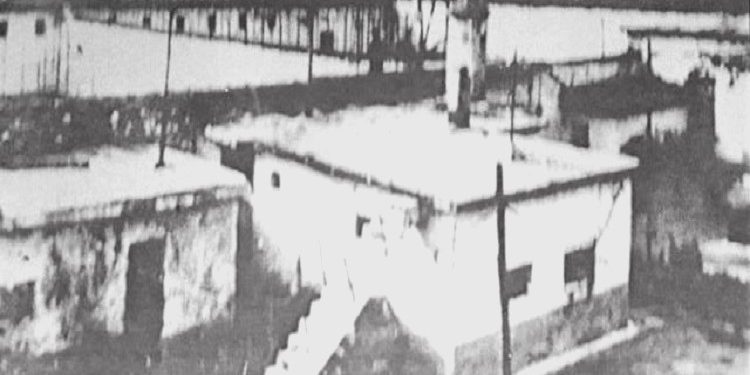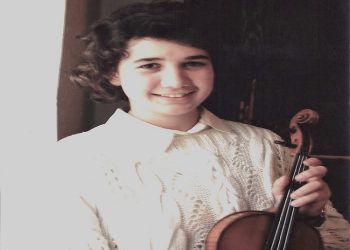By Skifter Këlliçi, – Boston –
Memorie.al / I continue to read with great curiosity and pleasure the memoirs of the late intellectual and writer Uran Kalakulla, who spent more than 20 years in the terrible communist prisons. And in one chapter of these memoirs published a few days ago, my attention was drawn to some fragments he dedicated to Fehmi Beshiri, whom he had met in the early ’60s of the last century in the prison-camp of Elbasan, where among other things he writes:
“I published a portrait of him a couple of years ago in the newspaper ‘Liria’,” the author writes about Fehmi Beshiri. “I had him as a friend, I loved him and he loved me, I even broke bread with him, as long as we were together, until they took me and sent me to Burrel and I left him there, because he needed something like a month to be released.” I was moved when I read these lines written with such sincerity, as well as the entire fragment from Uran Kalakulla, because Fehmi Beshiri was my father’s cousin’s son, Qemal’s, and I also have memories of him, some of which I am listing below.
It was an evening at the end of September 1944, when he, along with my father and uncle, Reshat, were listening to the BBC in the Albanian language. At that time I was seven years old, but I understood how events were unfolding in the world and in Albania. And this was because our house was a base of the National Liberation Movement, where meetings were also held, and where besides the above-mentioned broadcast, Radio Moscow was also heard in Italian.
Tajar Zavalani, who was the speaker of this broadcast, was an old friend of Uncle Reshat, with whom, as with other friends, he had spent many years in Leningrad and then in Moscow as a political emigrant in the years 1925-’34, was announcing from Radio London that the Russian armies from the East and the Anglo-American allied armies from the West were giving increasingly powerful blows to the German forces that were retreating.
“God willing that the Anglo-Americans land as soon as possible in the Balkans and in Albania,” said Fehmi Beshiri with his pronounced Tirana sub-dialect, “so that a Western democratic government will be created, otherwise Albania will fall under the communist heel.” My father and Uncle Reshat did not contradict Fehmi, who whenever he came to our house expressed this wish, which was also the wish of the overwhelming majority of Albanians, but, nevertheless, they explained to him that even if the communists won, the Anglo-American allies would also cooperate with the Russians, so that Albania would have a democratic regime. I remember well that Fehmi, as on other occasions, contradicted them.
“Wasn’t Tajar Zavalani, along with you and others, who with the return of Zog to Albania in December 1924,” he addressed Uncle Reshat, “sent by Fan Noli to Soviet Russia, where you saw with your own eyes the horrors of communism”?
Then, as far as I remember, Fehmi continued to say that the one who had understood better than anyone else what the Bolshevik communist regime of Lenin and Stalin was, was Tajar Zavalani himself, who had returned during Zog’s time from Russia to Albania, who after the fascist occupation was interned in Italy, but then from there had taken the road to England, had settled in London, from where with his voice from the BBC, he was showing that Hitler’s Germany would lose the war.
Then, as on other occasions, Fehmi wished that the communists would not take power in our country. Not only that, but he was showing that the communism of Stalin and the Nazism of Hitler were twins, because he had seen how the Nazis had acted in Vienna since the mid-’30s of the last century, when he was a medical student, where Nazi gangs had also been created, which had prepared the invasion of Austria by Hitler’s Germany.
My father and Uncle Reshat met other times in our house with Fehmi Beshiri, after Enver Hoxha became the head of the communist government. Both had been chairmen of the National Liberation councils of the neighborhoods where they lived and when they saw what terror then began in Albania with the establishment of the communist regime, they were disappointed. Neither of them became a member of the Communist Party, although Uncle Reshat could have become one, even of the Communist Party of the Soviet Union, during the years of his exile in Russia.
Therefore, with the amnesty declared by Zog, he had returned to his homeland, but had not reconciled with the Zogist regime, and had even been left without a job. And so what I mentioned above happened. As a result, both of them sided with Fehmi Beshiri. They saw how he was treated as the successor of a family of rich merchants and his name was included by the State Security in the list of dangerous people. They also saw that he was forced to work in construction, to carry mortar and bricks in the buildings that were being built in the “Shallvare” field at the end of the ’50s of the last century.
In his memoirs about Fehmi, among the most poignant I have read from writers who suffered in communist prisons, Uran Kalakulla, among other things, writes: “Fehmi had attended a classical gymnasium in a private college in Rome and still held in his memory verses of Horace, Ovid, and Virgil, by heart, in the original, i.e. in Latin, just like those of Homer, Hesiod, Pindar, Anacreon, and especially Sappho (I believe it is understood exactly why), in ancient Greek. And yet he had not studied classical literature in Vienna, at the university, but had enrolled in the faculty of medicine, but without being able to finish it.”
One day in June 1956, a first-year student of Albanian Language and Literature at the University of Tirana, I was studying ‘Ancient Greco-Roman History,’ which I would be taking as an exam, when Fehmi Beshiri appeared at home. Seeing me hunched over the notes I had taken during the lectures of this subject, which talked about the life and work of Virgil, the great Roman poet, he began to recite in Latin verses from the poem ‘Aeneid’ of this poet titled ‘The Descent of Aeneas into Hell,’ which Muzafer Xhaxhiu, our beloved professor, had recited to us in the Albanian language:
“O Aeneas, night has arrived…/ here is the place, / where the road divides in two: on one side, the right, / which leads you directly to the great ramparts of Pluto, / on the other, the left, which leads you to where the wicked are punished harshly.” I was stunned.
“Then why didn’t you study classical literature in Vienna?” I asked with curiosity.
“I made a mistake there, because medicine was not for my nature and soul,” he explained to me.
So he was left without finishing his higher studies. When my father came home, the two of them started their political conversations as usual. On April 4 of that year, that is, 1956, Enver Hoxha had written an article in the newspaper “Zëri i Popullit,” in which, in the spirit of Khrushchev’s report at the 20th Congress of the Communist Party of the Soviet Union, which had criticized the cult of Stalin and his crimes, the Albanian communists also had to rise and make criticisms from top to bottom, but also from bottom to top, so that the life of the party would be democratized.
And, as is known, after the report of Fiqret Shehu, secretary of the Party Committee of the Tirana district, she had been asked many questions to which neither she nor Beqir Balluku, delegated by the Political Bureau to this conference, had been able to answer, because they touched on very sharp problems related to the economic difficulties of the people, who were constantly being impoverished, while the leadership of the Party and the state were immersed in privileges and were becoming detached from the masses of the people.
“Did you hear, Qemal,” Fehmi said, turning to his father, “butcher Enver and those who stand by him, the disappointed communists, have been criticizing him, just as Khrushchev and his friends criticized the cult of Stalin.” At this point, my mother intervened and begged Fehmi to speak in a low voice, because Fehmi’s curses could be heard by the neighbors, especially since one lived on the first floor of our house. A famous hunter in Albania, he went hunting with Mehmet Shehu, Kadri Hazbiu, and had even gone with Enver Hoxha. He seemed a man of few words, but my father had never uttered a single word against the communists with him. He didn’t trust him.
The conversation heated up even more, because Fehmi hoped that as a much milder communist than Stalin, Khrushchev would wash his hands of him and bring a man to power who would at least do what was being done in Soviet Russia, among other things, that even in Albania, the class struggle would be softened, people would not be imprisoned for a word against the government about the serious economic situation, there would be more connections with the West, at least in the field of art, literature, science…!
However, these hopes of his and my fathers were dashed by Uncle Reshat, who came to our house later. As I mentioned above from the experience he had had during the ’30s of the last century which he had lived in the Soviet Union, where Stalin had killed millions of people, among whom were his close friends, Kamenev, Zinoviev, Kirov, Trotsky, etc., he could imagine how Enver Hoxha would continue to act, so he said:
“Nothing new will happen. Enver Hoxha will reduce some privileges of the second-tier leaders, but he will continue to exercise terror on the people and, most importantly, he will condemn all those who discussed at the Tirana Conference.” And indeed that is what happened. Having returned from Vlora, where he had gone to prepare the report he would give a few weeks later at the III Congress of the Party, Enver Hoxha attacked like a rabid wolf against the discussants who had indirectly criticized the party and himself for the situation in which the people had been reduced, with expulsions from the party, internment, and severe imprisonment against them.
Fehmi was also a great jokester. When in early June 1959, I was taking my final university exams, and Khrushchev visited Albania, he was telling my father one day what had happened those days when the great Soviet leader had visited the “Stalin” Textile Combine. Most of the machines in this combine, a gift from the Soviet Union, were in fact products of the Tsarist period. As a result, their quality left much to be desired, so much so that, as it was said then, the Czechs bought the fabrics produced with poor quality on these machines for “bad-money,” processed them in their modern factories, and sold them dearly.
“But this was not important for Khrushchev,” Fehmi recounted. “During that visit he would touch these fabrics with his hands and although they were rough, he would say: ‘Eti horosh, horosh’ meaning; ‘these are good, good’ and ordered with a wave of his hand that they be sent as a gift from the Albanian people, to the Soviet brothers.'” Although this sounds anecdotal, like the word “horosh” pronounced by Fehmi, which was a deformation of the Russian word “horosho,” the truth is that the Russian specialists, since June 1948, that is, after the breakdown of Albania’s relations with Tito’s Yugoslavia, continued the craft of the Yugoslav “brother” specialists.
With their salaries many times higher than the salaries of the poor Albanians, they continued to steal whatever they could, emptying the warehouses of the former Albanian merchants, who, as the well-known writer Petro Marko mentions in his book of memoirs ‘The Stones and the Clouds’, had had goods with which Albania could be sustained for 10 years, without importing even a single nail.’
Fehmi Beshiri also experienced a lot the breakdown of Enver Hoxha’s relations with the Soviet Union of Khrushchev and his followers, whom he dubbed; “modern revisionists.” But Fehmi did not hope that Enver Hoxha, left without any ally in Europe, because at the Moscow Meeting all the leaders of the communist parties of Europe scorned him; calling him; “an incorrigible fanatical Stalinist dogmatist” and even Gomulka, the head of the Polish communists, labeled him as; “a buffoonish hooligan,” so he did not hope that our dictator would connect with the West, because he had found a trusted friend further away from Russia and to the east, Mao Zedong, who gave him some economic support to hold on as Zeus on the Olympus of Albania.
But one day when he came to our house, he told us about a documentary he had seen those days on RAI programs about the people’s communes in China. A group of Italian ethnographers had visited such a commune on the border with India and had given the children there bags of candies. Not only the children, but also their parents had mistaken the candies for stones and had started playing with them. But when the stones had melted in their hands, parents and children had started licking their fingers and then were surprised that they had become… sweet. They had not seen candies until then, let alone sugar, and instead used fruit juice. – “This is who the late Enver has allied with,” Fehmi said then, shaking his head.
In June 1964, my father, who suffered from a heart condition, passed away unexpectedly. Fehmi was absent from the funeral ceremony. He had been sentenced to several years in prison for “agitation and propaganda” for a year. All of us in the family were very sad, especially my mother. Besides, she was afraid that during the investigations, Fehmi would be asked by the investigators with whom he had done this… “Agitation and propaganda” against the people’s power and, forced by them, might mention his conversations with my father and Uncle Reshat, who was still alive and could suffer the same fate. (In fact, Uncle Reshat could have suffered this fate, because being a Russian language teacher in a high school in Tirana, he would say innocently that; “Russian was a difficult language for Albanians and therefore was not learned by them.”
Such a dangerous testimony, because it was about the language of Lenin and Stalin, had reached Haxhi Kroi, Enver Hoxha’s personal and most trusted secretary, who respected Uncle Reshat, because he had been the closest friend of Avni Rustemi, who was shot to death by Ahmet Zog’s chief of staff, in his presence, on a day in April 1924.
Besides these, Uncle Reshat had also helped Kroi’s family during the National Liberation War. But it did not happen that way. Then I remembered my friends, Fadil Kokomani and Vangjel Lezho, journalists at Radio – Tirana, who were arrested in 1963, in an attempt to escape, who were shot years later, with whom, especially with Fadil, we had cursed Enver Hoxha up and down, but they had not denounced me, otherwise I could have suffered the same fate.
During conversations with Fehmi in my house, after he was released from prison, he would tell me about events that had happened to him with his investigators, during which he would tell them innocently: “I have never done either agitation or propaganda against the government…! When they asked me why I looked sleepy, I would answer; because, as usual, I had woken up at 2 in the morning to queue at the milk shop, otherwise I would be left with nothing.
When they asked me why I looked tired, I would answer that I had stood in line for many hours to buy a kilo of meat. Did I lie…? Tell me, Mr. Investigator, don’t you also get up at dawn to queue at these shops?”… -“The investigators,” Fehmi would continue without losing his composure, “would pursue their lips in embarrassment and order me to be silent.”
Fehmi never married. Maybe he thought that one day he would be thrown in prison, as happened, and he would also harm his wife and children. Maybe he wanted to remain faithful to the memories of some Viennese girl like Sappho of Antiquity, the poetess, whom I mentioned above in this writing. I remember that March afternoon in 1982, when Fehmi Beshiri was buried in the cemetery of Tufina near Mount Dajti, which he adored. A gentle breeze was blowing, bringing with it the rustling of the leaves of the pine and fir trees that surround the cemetery and it seemed to me that along with them, the verses of this poetess adored by Fehmi, who sang so beautifully of love, were also heard. Such was Fehmi Beshiri, as Uran Kalakulla also describes him in his book, fragments of which I have read on the pages of Memorie.al, from whom, in closing my memories of him, he writes:
“…In his soul, he had remained a true gentleman; he would call some people not by their names, but by the nickname ‘Albanian.’ But slowly he attached this nickname to everyone, even so much so that others began to call him ‘Albanian.’ It even went so far that today, almost among all our friends, when we happen to remember Fehmi; we first remember the nickname ‘Albanian,’ rather than his real name. But, with a fundamental difference, that Fehmi was not one of those ‘Albanians’ he stigmatized, but was a true Albanian, noble and patriotic, a gentleman in soul and honest, i.e., an Albanian with capital letters” / Memorie.al




